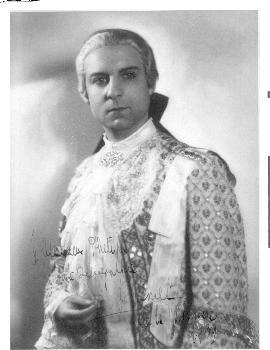From 1932 onwards, Bricoult was time and again a member of the Royal Flemish Opera in Antwerp.
In between, he sang at La Monnaie in Brussels (at least in 1936/37, in 1938/39 and in 1942), in Gent (Giuditta, 1936) or at
the opera theaters in Lille and Nantes (this is not necessarily a complete list, it's just what I was able to find so far). In
summer 1937, he sang Mylio in Le roi d'Ys at the Chorégies d'Orange open-air festival, with Ninon Vallin, René
Gilly and Louis Musy. His concerts took place, for instance, in Oostende (June 1934 and June 1936) or Ieper (excerpts from
Hérodiade with the Monnaie troupe in December 1936).(
But the center of his activity was certainly Antwerp, which is funny for modern Belgian standards: he was of course a French
speaker, but he appeared at the Royal Flemish Opera, which means that he sang in Dutch; that was clearly before the imbecile
hostility between Dutch and French speakers began to tear Belgium apart, and yes, it proves that it is actually possible for
native French speakers to learn Dutch, and the other way round, Dutch speakers can learn French, too (for decades now, most
everybody in both parts of Belgium has been declaring that totally impossible). Bricoult even sang in the world premiere of an
opera in Dutch: Swane by Maurits Schoemaker, Royal Flemish Opera Antwerp, 1933, role: Sanctelein), and in the
Antwerp premiere, again in Dutch of course, of Peter Grimes, where he sang the title role (25 May 1946).
However, when the Antwerp opera theater completely remodeled their troupe in 1952, and re-engaged a couple of singers who had
sung there in earlier years, not everybody agreed; the satiric newspaper 't Pallieterke made some sniding remarks on
"reactivated pensioners", whom they listed by name – one of them was Bricoult.
Reference 1; reference 2; reference 3;
reference 4; reference 5: Figaro, 22 July 1937; reference 6:
De Zeewacht, 23 May 1936; reference 7: Pourquoi pas?, 29 June 1934; reference 8: Het Ypersch nieuws, 5 December 1936;
reference 9: Tempo, June 1946; reference 10: Chris Ceustermans, De man die van mensen hield, Antwerp 2021;
reference 11; reference 12: 't Pallieterke, 25 September 1952
